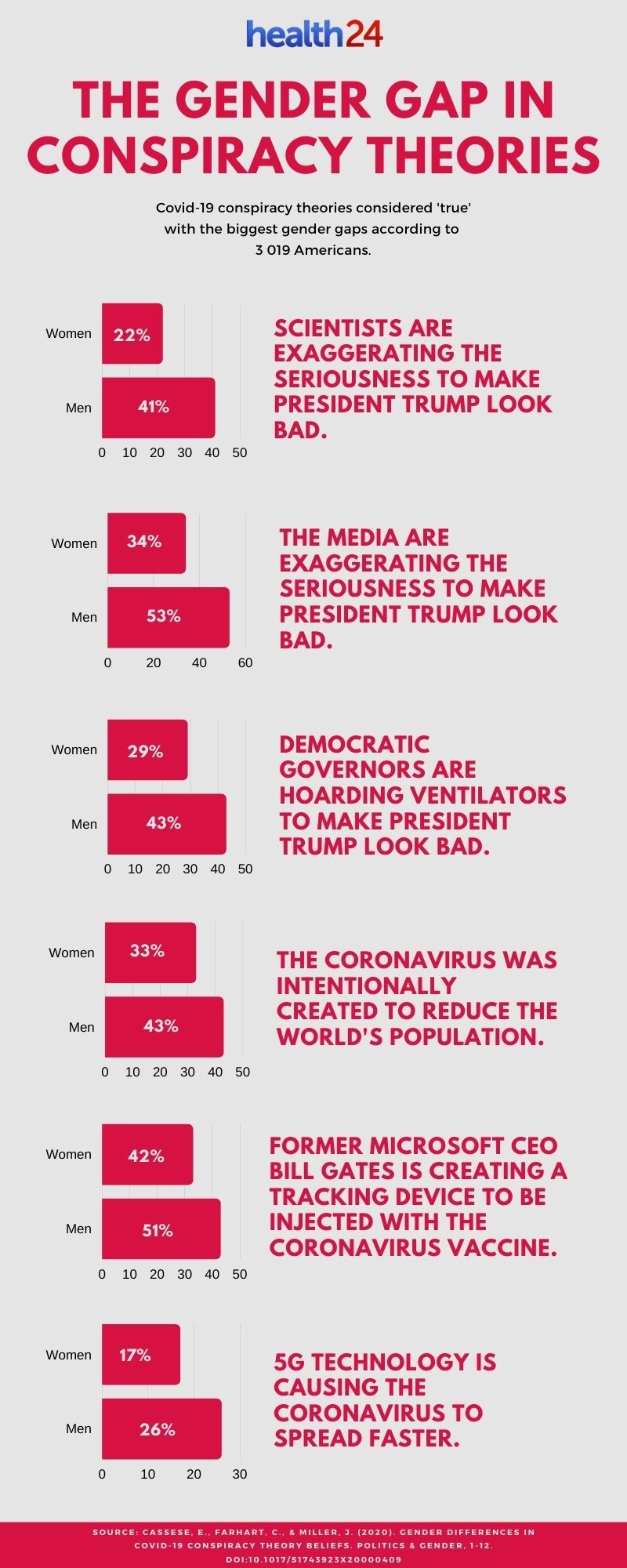- Men are far more likely to believe in Covid-19 conspiracy theories than women, a US study finds
- Some of the biggest gender gaps are related to theories around an agenda to take down President Donald Trump
- However, they did not find that being Democrat or Republican had any effect on the findings
As you wade through the conspiracy theories that have bloomed in the pandemic on your social timelines or in WhatsApp groups, you may have noticed that the people sharing these wild theories tend to be of the masculine persuasion.
And it's not just an observation. A study has actually confirmed that men are more likely than women to believe in Covid-19 conspiracy theories.
Published in Politics and Gender, researchers from the University of Delaware found a significant gender gap when it comes to who is spreading conspiracy theories, and dived in to find out what is causing this divide.
In previous studies, Americans who touted this pandemic-related misinformation tended to be Republicans, conservatives, those struggling with uncertainty, and people who are denialists and believed in other conspiracy theories even before Covid-19.
There are also certain personality traits, a need to be unique, ostracisation and cognitive and proportionality biases that contribute to these beliefs.
But when it comes to gender, it's been used more as a control for data than something to correlate with conspiracy theory beliefs.
READ | The psychology behind conspiracy theories – why do we want to believe them?
5G, President Trump and Bill Gates
The study asked 3 019 demographically-diverse Americans what their thoughts were on 11 popular conspiracy theories related to the coronavirus and what they perceive to be true.
Men were far more likely to believe in these conspiracy theories.
Across party lines
There was one hypothesis that women were more likely to be Democratic, which could explain the gender gap, but the researchers found that the gap extended beyond party lines.
"The gender differences are notable, given that gender gaps in issue attitudes tend to be much smaller in magnitude than what we observe here," says the study.
"These results are surprising given that past work does not find a consistent association between gender and [conspiracy theory] beliefs."
READ | The rise of the anti-vax movement in the age of coronavirus
So why is there a difference?
There are three main factors the study explored to explain the phenomenon – personal uncertainty, learned helplessness and conspiratorial thinking – and how these might relate to gender.
Uncertainty is a result of the pandemic specifically, as well as learned helplessness where a person is continuously exposed to a stressful situation and comes to believe they can't do anything about their situation even when other options arise.
Conspiratorial thinking is less situational and relates to conspiracy-type beliefs pre-Covid-19.
Men scored much higher on conspiratorial thinking and learned helplessness, while the gender difference in uncertainty wasn't statistically significant and not found to be a contributing factor to the gap.
"Although drawing strong causal conclusions about the mediational process at work is beyond the scope of our data, these results are consistent with the notion that gender has an influence on Covid-19 [conspiracy theory] beliefs that work through dispositional factors."
READ MORE | Millennials most likely to skip flu shot and believe 'anti-vaxxer' claims
Preventative measures
It's also been proven in previous studies that women are more likely to take preventative measures in healthcare like practising physical distancing and wearing masks, which might be why they feel they have more control over the situation than men.
"A better understanding of how people grapple with helplessness and uncertainty – and the role that gender plays in this process – is important for understanding the antecedents of politically and socially consequential [conspiracy theory] beliefs, as well as compliance with the recommendations of public health experts in this kind of high-risk pandemic context."
But it's important to note that anyone can be susceptible to conspiracy theories. It's all about whether it can tap into the right preconceived prejudices that confirm what we believe we already know about the world.
READ | New coronavirus is not man-made, new study confirms
Image credit:




 Publications
Publications
 Partners
Partners
















